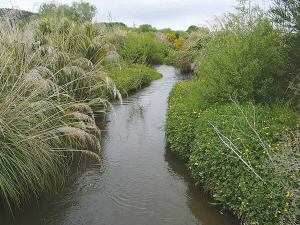Environment Canterbury urges buyers to check wastewater systems on rural properties
Buying or building a rural or semi-rural property? Make sure you know where the wastewater goes, says Environment Canterbury.
 More than 600km of Taranaki river and stream banks will be planted with a million native plants next winter.
More than 600km of Taranaki river and stream banks will be planted with a million native plants next winter.
More than 600km of Taranaki river and stream banks will be planted with a million native plants next winter as the region’s farmers take advantage of a $5 million government boost.
The funding for the Transforming Taranaki riparian management programme will allow eligible farmers to buy native plants for $1 each, create 80 new jobs and bring environmental benefits to the entire region.
The Taranaki Regional Council scheme has been running for 27 years, with farmers voluntarily planting and fencing thousands of kilometres of waterways. In that time Council officers have prepared nearly 3,000 individual riparian plans, and more than 6.2 million plants have been distributed at cost.
The programme’s goal is improved water quality and an increase in biodiversity, with the plants providing habitat for native birds and cover for aquatic species.
About 900,000 plants are being contract-grown for the 2021 winter planting season. The opportunity to buy $1 plants will be offered to Council plan holders in the intensively farmed zone of the Taranaki ring plain and coastal marine terraces, with priority given to those who have demonstrated a strong commitment to riparian planting and fencing over the years.
If eligible, they can order between 500 and 2,000 plants per plan.
The cost includes planting by Council-arranged contractors, whereas previously that had been the responsibility of the landowner. Plan holders will be required to erect fences to protect the plants, estimated to be worth $4.1 million. The value of the combined fencing and planting is expected to be near $10.8 million.
Council land services manager Don Shearman says the funding is great news for the region.
“Taranaki farmers have put in years of hard work planting and fencing their waterways all at their own cost – because they know it’s the right thing to do. And many are now so close to completing their plans.
“This funding will save them thousands of dollars, plus precious time, allowing them to push forward to the finishing line.
“We’re already seeing environmental benefits from the programme, with a NIWA study last year finding many Taranaki sites had the best water quality they’d had since 1995. We’re excited to see the improvements continue.”
The $5 million came from the Public Waterways and Ecosystem Restoration Fund, administered by the Ministry for the Environment. It is part of the Government’s wider Jobs for Nature Programme, part of its COVID-19 recovery package.
The World Wide Sires National All Day Breeds Best Youth Camp Best All Rounder plaudit has become family affair, with 2026 Paramount Cup winner Holly Williams following in her sister Zara's footsteps.
DairyNZ is giving New Zealand farmers a unique opportunity to gain hands-on governance and leadership experience within the dairy sector.
Herd improvement company LIC has posted a 5.2% lift in half-year revenue, thanks to increasing demand for genetics.
According to the latest Fresh Produce Trend Report from United Fresh, 2026 will be a year where fruit and vegetables are shaped by cost pressures, rapid digital adoption, and a renewed focus on wellbeing at home.
The Roar is a highlight of the game hunting calendar in New Zealand, with thousands of hunters set to head for the hills to hunt male stags during March and April.
OPINION: The past few weeks have been tough on farms across the North Island: floods and storms have caused damage and disruption to families and businesses.